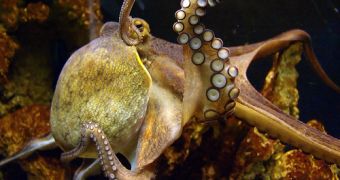Scientists from Australia, Norway and Germany have, for the first time, collected venom from octopuses in Antarctica. This may give valuable information and significantly help our understanding of the properties of venom as a drug for diseases like allergies, pain management and cancer.
This study was a collaboration between research teams from the University of Melbourne, Australia, the Norwegian University of Technology and Science, Norway, and the University of Hamburg, Germany. It was the first time that venom from the Antarctic octopus was collected, and this also pointed out four new species of octopus to scientists.
The drug industry always considered venom as something very valuable for medical development. Still only recently did scientists discovered the amazing properties of octopus, cuttlefish and squid venoms, especially if they live in waters with temperatures below zero.
Dr Bryan Fry from the University of Melbourne's Bio21 Institute and the team's leader says that science does not know yet how did venomous animals managed to adapt their venom effectiveness to sub-zero temperatures, where most venoms are harmless.
He added that “this is the first study that has collected Antarctic octopus venom and confirmed that these creatures have adapted it to work in sub zero temperatures - the next step is to work out what biochemical tricks they have used.”
Apparently, the venom of the Antarctic octopus has a variety of toxins, two of which had never been discovered before. “We have discovered new small proteins in the venom with very intriguing activities – these are potentially useful in drug design, but more will be revealed as the study continues,” he adds.
Last year, Dr Fry said that all octopuses are venomous and this study reinforces his theory. The team collected 203 octopuses from Antarctic waters, genetically profiled every specimen and collected venom for further lab analysis. The new venoms collected will give more information and help understand the way they work.
“An understanding of the structure and mode of action of venom found in all octopuses may help design drugs for conditions like pain management, allergies and cancer. Not only do Antarctic octopuses have the most unique venoms out there, but there is a lot more species than we originally thought,” Dr Fry added.

 14 DAY TRIAL //
14 DAY TRIAL //